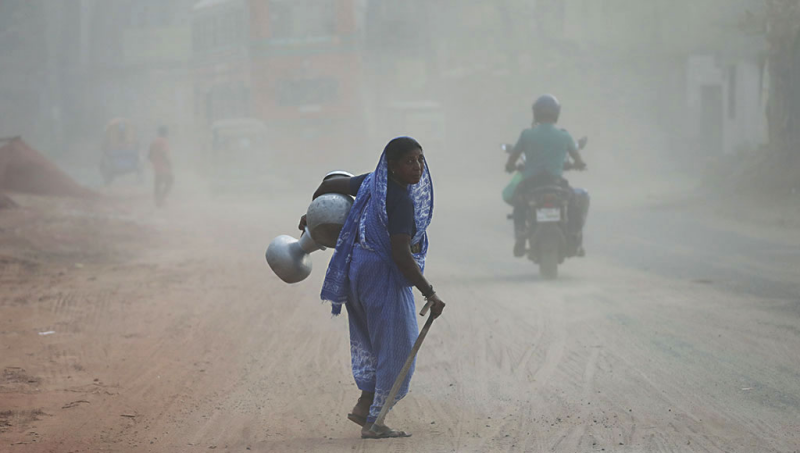
By : Ime Richard Aondofa | Edited by Henry Owen
Across Africa, urban centers are grappling with a growing environmental crisis: deteriorating air quality. Once considered a challenge of industrialized nations, air pollution has become a pressing issue for African cities, affecting millions of residents and straining public health systems. This article explores the causes, impacts, and responses to air pollution in major African cities, with a particular focus on Nigeria.
Africa is undergoing rapid urbanization. According to the United Nations, the continent's urban population is expected to double by 2050. While urbanization brings economic opportunities, it also leads to increased vehicular emissions, industrial activities, and construction, all contributing to poor air quality. Cities like Lagos, Cairo, and Johannesburg have witnessed significant growth, but this expansion often outpaces the development of infrastructure to manage pollution.
The primary sources of air pollution in African cities include vehicular emissions, industrial activities, and the use of solid fuels for cooking. In many urban areas, a significant portion of the population relies on biomass fuels, such as wood and charcoal, for cooking. This practice releases large amounts of particulate matter into the air, exacerbating respiratory problems.
Additionally, the proliferation of old, poorly maintained vehicles and the lack of stringent emission standards contribute to elevated levels of pollutants like nitrogen dioxide and sulfur dioxide.
The health impacts of air pollution in Africa are profound. The World Health Organization estimates that air pollution is linked to approximately 712,000 deaths annually across the continent. Respiratory diseases, cardiovascular conditions, and premature mortality rates are on the rise, particularly among vulnerable groups such as children, the elderly, and individuals with pre-existing health conditions.
In Nigeria, cities like Lagos and Onitsha have reported increasing cases of asthma, bronchitis, and chronic obstructive pulmonary disease (COPD), correlating with high levels of particulate matter (Source).
Beyond health, air pollution imposes significant economic costs. In South Africa, air pollution has been estimated to account for 14% of the country's GDP, considering factors like healthcare expenses and lost labor productivity (Source).
Similarly, in Nigeria, the economic burden is substantial, with industries facing increased operational costs due to health-related absenteeism and reduced workforce efficiency.
Accurate data is crucial for addressing air pollution. However, many African nations lack comprehensive air quality monitoring systems. In South Africa, only a third of the 130 air quality stations were fully operational as of July 2025 (Source).
This data gap hampers the ability to assess pollution levels accurately and implement effective policies. Initiatives like AirQo in Uganda are working to bridge this gap by providing real-time air quality data, but such efforts need to be scaled across the continent (Source).
Recognizing the severity of the issue, several African cities are taking steps to combat air pollution. In Nairobi, Kenya, the government has introduced policies to reduce emissions from public transport and promote the use of cleaner fuels. Johannesburg has implemented stricter vehicle emission standards and invested in renewable energy sources.
However, these initiatives are often hindered by limited financial resources, political will, and public awareness.
Nigeria, Africa's most populous country, faces significant challenges related to air pollution. Cities like Lagos and Onitsha are among the most polluted in the world, with levels of particulate matter far exceeding World Health Organization guidelines.
Despite the severity of the situation, the Nigerian government has been criticized for its lack of action. Experts have urged policymakers to prioritize air quality, emphasizing the need for comprehensive strategies that include improving public transportation, enforcing emission standards, and promoting the use of clean cooking technologies (Source).
Air pollution in African cities is a multifaceted issue that requires urgent attention. While some progress has been made, much remains to be done. Governments must invest in infrastructure, enforce environmental regulations, and raise public awareness about the dangers of air pollution.
Additionally, international cooperation and support are essential to address this transboundary problem. Only through concerted efforts can African cities provide their residents with clean air and a healthier future.
📩 Stone Reporters News
🌍 stonereportersnews.com | ✉️ info@stonereportersnews.com
📘 Facebook: Stone Reporters | 🐦 X (Twitter): @StoneReportNews
References
State of Global Air 2023: Air Pollution and Health Impacts in Africa. Link Clean Air Fund: Advancing Clean Air in Africa. Link UN-Habitat: Air Quality in African Cities. Link AirQo: Bridging the Air Quality Data Gap in Africa. Link Environmental News Nigeria: Nigeria, Others Must Act Now Against Air Pollution. Link


Add comment
Comments